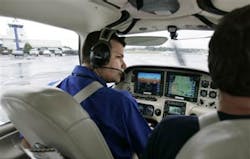Business Air Travel Now More Complicated
The uncomfortable business flight has gotten even more uncomfortable.
And many executives will be looking at flying less or chartering a plane in the coming months.
Just how much airline business travel suffers will depend largely on how the new restrictions are managed in the next several weeks.
Tim Sieber, vice president and general manager of The Boyd Group, an aviation consulting firm, said in two or three weeks, the reaction toward restrictions on carry-on items may ease.
Currently, nearly all fluids are banned from air travelers' carry-on baggage.
He said the current restrictions "are not sustainable going forward."
The rules mean more standing in line to board a plane and then waiting for checked luggage to arrive. All this reduces time the business traveler has during the day to carry out his job.
Randall Lewis, executive vice president of Upland-based Lewis Operating Corp., said executives from his company do a lot of traveling to Northern California and Nevada.
The traveling is a mixture of private charter and commercial flights.
Requirements for even earlier arrival at airports will likely push even more of the company's travel business into the realm of air charter.
Private charters allow flexibility to leave when the traveler needs to leave. And a chartered plane can take the business executive closer to where he needs to be.
For example, Lewis executives may need to visit a site north of Sacramento and one south of Sacramento.
A charter plane can take them to an airport near the northern site and then fly them to an airport near the southern site. And then fly them home in the same day, Lewis said.
Ontario-based Guardian Air Services, an air-charter business, has seen a 10 percent to 15 percent increase in bookings since the terrorist plot in Britain was disclosed, said John Wilkins, senior vice president.
Earlier this month the company announced it was purchasing nine Premier IA jets from Raytheon Aircraft Co.
This would boost its fleet from 13 to 22.
"Lines and cumbersome travel issues are taking its toll on the business traveler," Wilkins said.
Growth in the air-charter business has been a steady upward slope for several years but now that has become exponential, Wilkins said Friday.
Empire has had executives from this area go to meetings in San Diego, Sacramento, the East Bay and back home, all in the same day, Wilkins said.
John Allen, president and chief executive officer of Grand Terrace-based Wilden Pump and Engineering, returned home Friday from a business meeting in Tallahassee, Fla.
His commercial flight arrived on time.
"I was pretty impressed by the people working at the airports and travelers. People (travelers) coming through the airports knew what they had to do and were taking care of business," he said.
For many businesses, charter won't be an option. It's just too expensive, he said.
And staying at home, communicating by e-mail or teleconferencing isn't an option either.
American business is facing the most stressful period in flying and at the same time it is a period where building relationships in distant markets is most needed for a company's survival, he said.
Copyright 2005 LexisNexis, a division of Reed Elsevier Inc. All rights reserved.
Terms and Conditions | Privacy Policy
News stories provided by third parties are not edited by "Site Publication" staff. For suggestions and comments, please click the Contact link at the bottom of this page.

